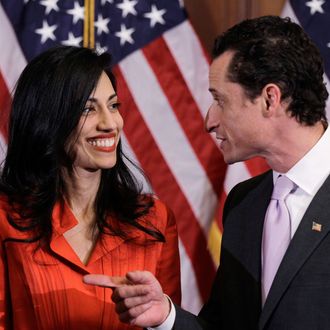
Clearly New York voters still have a sense of humor. How else to explain a new poll showing former congressman Anthony Weiner, of the bulging boxer-briefs, placing second in the Democratic mayoral primary, with 15 percent? I’m not joking that the results are something of a joke: With all due respect to the good folks at NBC-Marist, this was a poll of 1,127 (alleged) adults — a mere 556 of whom were registered Democrats — conducted in the middle of Weiner’s semi-confessional publicity blitz. Weiner’s showing (argh — the unintended double entendres are just beginning) is mostly about name recognition: I was in North Carolina last weekend, talking to people from Chattanooga, Austin, and Phoenix, and before I could finish the sentence “I write about New York politics,” they’d blurt out, “Anthony Weiner!”
So let’s not get too carried away. But there is some real meaning in the numbers, nevertheless. They are another indication that Christine Quinn’s lead is very soft. Her campaign team never expected her to cruise to a double-digit win, especially with pre-Weiner polls consistently showing “undecided” scoring in the twenties and thirties. Quinn’s had a bumpy few weeks: Caving on a paid-sick-leave City Council bill after stalling it for months, being the subject of a tough-but-accurate Times story detailing her temper. Yet two things have always been the foundations of Quinn’s run, and they haven’t changed. She’s an appealing, culturally well-timed combination of gay, female, and middle class; and the city remains basically satisfied with Mayor Michael Bloomberg, to whom Quinn has been a very loyal junior partner for seven years.
The real threat to Quinn is mathematical and demographic. Weiner would likely take white, Jewish, and ethnic votes away from her, in Manhattan, Brooklyn, and Queens. Even if he only ends up with 5 to 10 percent it would be nearly impossible for Quinn to hit 40 percent and avoid a runoff, where things could get very dicey. Conversely, Bill Thompson should be thrilled to have Weiner join the festivities; he could start making runoff plans right away if Weiner makes it official. There’s mixed news in all this for Bill de Blasio: His numbers didn’t really move in the latest poll, and there’s clearly an opening for a challenge to Quinn. Less helpfully, Weiner is hogging the media attention and could grab some of the outer-borough votes that are key to de Blasio’s chances.
Or maybe the biggest lesson here is that sexting is a great campaign strategy.





























